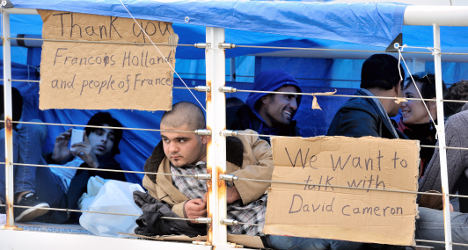France rejects four out of five asylum seekers

France turned down 83 percent of asylum cases last year - a far higher rate than other European countries, new figures revealed this week. Asylum-seeker rights groups in France have expressed their concern.
In 2013 France looked at 61,455 asylum cases but only granted protection to 10,470 of those seeking sanctuary in the country, according to new figures from the EU’s Eurostat agency released on Monday. Most of those were granted refugee status, with a small number given a lesser "subsidiary protection".
That’s an acceptance rate of just 17 percent, which compares unfavourably with the Europe-wide average of 34 percent for first-instance decisions, which asylum seekers have the chance of overturning on appeal.
In Germany, where 76,165 decisions were made on asylum last year, the percentage of those accepted stood at 26.5 percent and in the UK 38 percent of 22,340 asylum cases were granted protection. Italy gave protection in 64 percent of cases and Sweden granted some kind of asylum in 54 percent of the 45,000 cases ruled on.
The low number of positive outcomes in France has concerned certain rights groups.
“Yes it’s a problem. We are worried by why it is so low compared to other European countries,” said Matthieu Tardis , the head of the general secretariat of France Terre D’Asile a leading non-profit organization which provides “legal and social services” to asylum seekers and refugees in France.
Tardis told The Local there were various reasons why France accepts fewer asylum seekers on average than other countries, one of which is regularly put forward by the government.
“The reason always given by the Ministry of Interior is that France does not receive applications from what they deem ‘good’ countries, for example countries ravaged by war like Syria or Afghanistan,” he said.
Figures show that most of those seeking asylum in France come from Kosovo, the Democratic Republic of Congo and then Albania, whereas other countries like Germany count Syrians among the top three applicants. In Britain, Pakistanis made up the largest number of applicants followed by Iranians and then Sri Lankans.
“The government is always telling us we don’t receive the same kind of applications as other countries in Europe. There may be some truth in that.
“For example, in France we only had 1,300 asylum seekers from Syria, which is not many considering what’s going on there. On the other hand we used to get a lot of applications from Albania, but they were often not well put together," he said.
OPINION: 'France is failing Syiran in its duty to refugees'

For Tardis and France Terre d’Asile there are other explanations for the low number of cases accepted, that perhaps the government is less willing to accept.
“There is a lack of resources. I think those making the decisions in the first instance have to rule on two cases a day. That's difficult. So the decision-making process is often poor.
“There is also a problem with a lack of accommodation for asylum seekers. We only have space for 22,000 people and we had 65,000 applications last year. This is becoming more and more serious.
“If you have accommodation you have a higher chance of having your application accepted because you have access to legal assistance and you are not having to worry about where you sleep every night and where you are going to get your next meal.”
Eurostat figures revealed that across Europe as a whole there were almost 435,000 asylum applications registered last year.
That represents a dramatic increase on the 335,000 requests made in the previous year.
Of the applications made last year 127,000 were to Germany, (29 percent) 65,000 to France (15 percent), 54,000 to Sweden and 30,000 to the UK (7 percent).
Syrians and Russians accounted for nearly a quarter of all asylum seekers to Europe’s 28 nations.
Comments
See Also
In 2013 France looked at 61,455 asylum cases but only granted protection to 10,470 of those seeking sanctuary in the country, according to new figures from the EU’s Eurostat agency released on Monday. Most of those were granted refugee status, with a small number given a lesser "subsidiary protection".
That’s an acceptance rate of just 17 percent, which compares unfavourably with the Europe-wide average of 34 percent for first-instance decisions, which asylum seekers have the chance of overturning on appeal.
In Germany, where 76,165 decisions were made on asylum last year, the percentage of those accepted stood at 26.5 percent and in the UK 38 percent of 22,340 asylum cases were granted protection. Italy gave protection in 64 percent of cases and Sweden granted some kind of asylum in 54 percent of the 45,000 cases ruled on.
The low number of positive outcomes in France has concerned certain rights groups.
“Yes it’s a problem. We are worried by why it is so low compared to other European countries,” said Matthieu Tardis , the head of the general secretariat of France Terre D’Asile a leading non-profit organization which provides “legal and social services” to asylum seekers and refugees in France.
Tardis told The Local there were various reasons why France accepts fewer asylum seekers on average than other countries, one of which is regularly put forward by the government.
“The reason always given by the Ministry of Interior is that France does not receive applications from what they deem ‘good’ countries, for example countries ravaged by war like Syria or Afghanistan,” he said.
Figures show that most of those seeking asylum in France come from Kosovo, the Democratic Republic of Congo and then Albania, whereas other countries like Germany count Syrians among the top three applicants. In Britain, Pakistanis made up the largest number of applicants followed by Iranians and then Sri Lankans.
“The government is always telling us we don’t receive the same kind of applications as other countries in Europe. There may be some truth in that.
“For example, in France we only had 1,300 asylum seekers from Syria, which is not many considering what’s going on there. On the other hand we used to get a lot of applications from Albania, but they were often not well put together," he said.
OPINION: 'France is failing Syiran in its duty to refugees'

For Tardis and France Terre d’Asile there are other explanations for the low number of cases accepted, that perhaps the government is less willing to accept.
“There is a lack of resources. I think those making the decisions in the first instance have to rule on two cases a day. That's difficult. So the decision-making process is often poor.
“There is also a problem with a lack of accommodation for asylum seekers. We only have space for 22,000 people and we had 65,000 applications last year. This is becoming more and more serious.
“If you have accommodation you have a higher chance of having your application accepted because you have access to legal assistance and you are not having to worry about where you sleep every night and where you are going to get your next meal.”
Eurostat figures revealed that across Europe as a whole there were almost 435,000 asylum applications registered last year.
That represents a dramatic increase on the 335,000 requests made in the previous year.
Of the applications made last year 127,000 were to Germany, (29 percent) 65,000 to France (15 percent), 54,000 to Sweden and 30,000 to the UK (7 percent).
Syrians and Russians accounted for nearly a quarter of all asylum seekers to Europe’s 28 nations.
Join the conversation in our comments section below. Share your own views and experience and if you have a question or suggestion for our journalists then email us at [email protected].
Please keep comments civil, constructive and on topic – and make sure to read our terms of use before getting involved.
Please log in here to leave a comment.